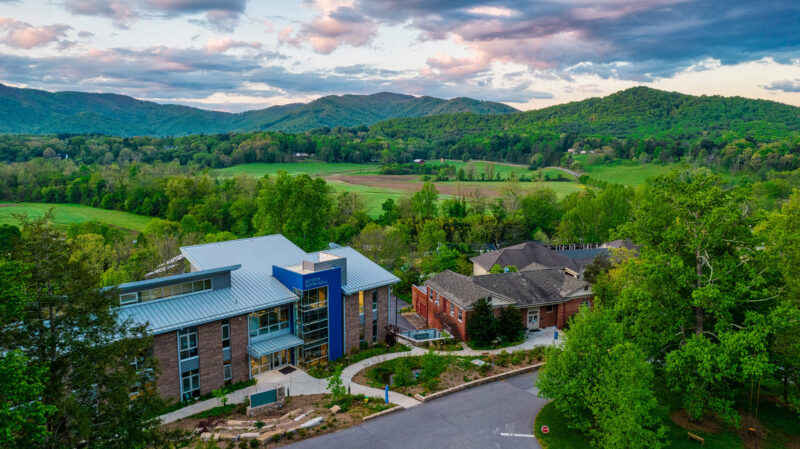
To address what the U.S. Surgeon General Vivek Murthy recognizes as “the defining public health crisis of our time,” Warren Wilson College is one of 13 colleges to receive nearly $3.3 million in funding from The Endeavor Foundation for the first phase of “Enhancing Student Learning and Experience through Campus Wellness, Student Well-being and Mental Health Initiatives.”
The first phase planning and capacity grant designed as a precursor to a total of $8.5 million toward students’ well-being. The multi-year collaborative project seeks both to respond to pressing needs and to integrate attention to mental health, well-being and wellness throughout student learning.
“Like every college across the country, Warren Wilson has seen a significant increase in mental health support needs for our students over the past few years,” said Dr. Damián J. Fernández, president of Warren Wilson. “It is an issue that is critical to student success. This grant from The Endeavor Foundation is a step forward in our efforts to address the mental health needs of our students. We are committed to the well-being of our community, and this funding will enable us to enhance our comprehensive approach and provide more accessible support.”
Two out of five undergraduate students — including nearly half of female students — say they frequently experience emotional stress while attending college, according to a survey published in March by Gallup and the Lumina Foundation, a private independent organization focused on creating accessible opportunities for post-secondary learning.
“Student mental health issues represent an urgent challenge. These issues affect students in ways that prevent them from full participation in campus life and rob them of the precious sense of well-being which should be theirs,” said Julie Kidd, president of The Endeavor Foundation. “We hope that the colleges’ work will help them transform their communities as well as inspire other institutions of higher learning to address challenges collectively.”
Ashley Kidd, vice president and director of programs at Endeavor, said that the original idea in bringing the colleges together was “to work together to raise the visibility of smaller liberal arts colleges by drawing attention to the strength of their student-centered approaches and to the deep, transformative learning that takes place on their campuses.”
In recent years, Kidd said, the focus for the colleges in the group, dubbed the “Endeavor Lab Colleges,” evolved into discussion about the many challenges facing higher education and small colleges even more acutely and the decision to take on one of them collectively and collaboratively.
“A strong future for higher education in the United States lies in collaboration, not competition,” Kidd said. “We are confident that we will see in this emerging project the benefits of collaboration as the Endeavor Lab Colleges work jointly to tackle the pressing problem of student mental health challenges. I salute their courage and dedication in doing so. Their courage is indeed a source of inspiration for our work at Endeavor.”
Phase I, which will unfold over two years, focuses on immediate capacity building and the development of shared pilot projects within four thematic areas, including credit-bearing curricular initiatives related to mental health and well-being; explorations of purposeful life and work, including defining personal values and what it means to live a meaningful life; place-based experiential learning in non-traditional classroom spaces; and expanded services and supports for mental health and well-being, including community care, clinical and non-clinical interventions and approaches, peer counseling and restorative justice.
Each college has received $100,000 this year and will receive $75,000 next year for institutional capacity building. The Endeavor Lab Colleges will also develop and implement a process for continued and deepening collaboration. The successful completion of phase I will provide access to $5.225 million over three additional years, during which the schools will join forces to advance the most exciting and promising initiatives in one or more of the thematic areas. Together, they will develop programs and models that can be shared across the collaboration and to other liberal arts institutions.
“In this time when the value of higher education and of liberal arts education is regularly called into question, this project will show the power, relevance and ingenuity of the liberal arts,” said Isabel Roche, executive director for special programs in higher education at Endeavor. “The colleges’ shared commitment to attending to student and community needs around mental health, well-being and wellness in expanded and new ways will allow for a fuller and more dynamic realization of the liberal arts ambition of educating the whole student, through greater integration, examination and care for the other forms of self.”
The other colleges that will receive the grant include Antioch College, in Yellow Springs, OH; Bennington College in Bennington, VT; Blackburn College in Carlinville, IL; College of the Atlantic in Bar Harbor, ME; Northland College in Ashland, WI; Prescott College in Prescott, AZ; Randolph College in Lynchburg, VA; St. John’s College, Annapolis in Annapolis, MD; St. John’s College, Santa Fe in Santa Fe, NM; Sterling College in Craftsbury Common, VT; Unity Environmental University in New Gloucester, ME; and Wells College in Aurora, NY. They have been convened as a group by The Endeavor Foundation since 2016.
“Many colleges and universities are driven to prepare their students for a particular job or professional role,” said Lori Collins-Hall, the grant project director and vice president and chief operating officer at Sterling College. “Given the mental health crisis we are witnessing among young people on our campuses, we are united in our aim to equip students with the curiosity, creativity, interpersonal communication skills, resilience and capacity for critical thought and self-efficacy that are essential for successful careers, meaningful lives and engaged citizenship in today’s world.”